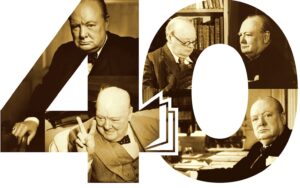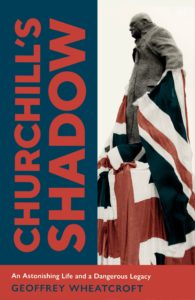Bulletin #162 — Dec 2021
Churchill, Master and Commander

November 28, 2021
Interview with author Anthony Tucker-Jones
Anthony Tucker-Jones’s fascinating new book, Churchill, Master and Commander: Winston Churchill at War 1895–1945 explores the extensive military and political career of the UK’s most renowned and respected wartime leader, and examines how his formative military experiences influenced his strategic leadership at the highest level.
We recently sat down with Anthony to find out a little more about the book.
- Firstly, can you tell us about your new book and what inspired you to write it?
Well believe it or not it was partly inspired by the discovery of an old Homburg hat! I found one in an antiques shop just like the ones worn by Winston Churchill. It got me to thinking that Churchill had appeared in many of my previous books but he was never centre stage. It also made me consider how had he managed to be in exactly the right place at exactly the right time in May 1940. He claimed that he had been preparing his whole life for becoming Prime Minister, but I wondered if this was just another famous Churchill sound bite made with an eye on history.
Furthermore, in a previous career in London I had worked in one of the very buildings Churchill had worked in – this was the Old War Office Building in Whitehall built in the early 1900s. I had been a stone’s throw from the Old Admiralty Building, Downing Street, the Cabinet Office, the Cabinet War Rooms and the Houses of Parliament – all places regular frequented by Churchill in his many roles as a politician.

2025 International Churchill Conference
2. Most books on Churchill tend to focus on his political career and wartime premiership, why did you choose to focus on Churchill’s military career?
Churchill Master and Commander is very much designed to look at Churchill’s achievements from a military perspective. I am foremost a military historian so that really shaped my approach. What fascinated me was that in 1940 Churchill became Britain’s political master and it military commander. He achieved the latter by appointing himself the country’s very first defence minister, which gave him direct control of Britain’s war effort. This was a very important move that is often overlooked by historians. I was aware of his impact on the conduct WW2, but I did not fully appreciate what made him so eminently suited to being a wartime leader. I therefore set myself the task of looking at what had forged him into a warlord both as a soldier and as a politician in charge of Britain’s armed forces
The impression I got was that Churchill ultimately was a frustrated soldier, he chose politics in order to follow in his father’s footsteps. However, if he had remained in the army I could well imagine him becoming a very successful general – though his impetuousness would undoubtedly have got him in trouble. Nonetheless, his links with the armed forces endured because he served as the political head of the Royal Navy twice as First Lord of the Admiralty, Minister for Munitions and the political head of the Army and the Royal Air Force as Secretary of State for War and Air. The deeper I delved into his career the more I became convinced that the young lieutenant in him never completely died. Throughout his life he continued to be drawn to the sounds of the guns, much to the dismay of Clementine his wife and his commanders.
3. Did you learn anything new about Churchill during the research process?
The key thing I learned is that the popular one dimensional view of Churchill as this highly pugnacious individual is extremely inaccurate. I definitely discovered a lot of new things about him. For instance, it came as a surprise that he wanted to use Czech mercenaries to prop up the Whites during the Russian Civil War. Likewise, I was amazed by his continuing enthusiasm for the use of mustard gas. This of course was employed during the First World War and subsequently banned by the international community. However, Churchill authorised its use in Russia against the Bolsheviks. He also urged its use in Afghanistan, Britain, Iraq, Ireland and Germany, but luckily each time wiser counsels prevailed. In addition, he advocated the deployment of Anthrax against Germany’s livestock during WW2. I also found that it is ridiculous to hold Churchill solely responsible for things like the Tonypandy riots, the conduct of Black and Tans, the division of the Middle East and the Bengal famine. Furthermore, I gained a much greater appreciation for his approach to such controversial issues as Irish and Indian Home rule, which have unfairly blighted his legacy.
4. Churchill endured triumphs and failures throughout his career as a military commander, was there a particular moment that stood out to you?
Well I think it will come as no surprise if I say that 1940 was his finest moment. He took that difficult decision to effectively abandon France and authorise the evacuation of the British Expeditionary Force from Dunkirk. He also took the difficult decision not to negotiate with Hitler and instead chose to fight the Battle of Britain exposing Britain’s cities to the terrors of the Blitz. Another moment that stood out was August 1944 when he did his upmost to derail the Allied landings in the South of France. He felt the Allies should not further weaken their efforts in Italy after D-Day. When he did not get his own way it clearly indicated that his influence over the strategic conduct of WW2 had come to an end. America by this stage was very firmly the senior partner and rightly was in the driving seat.
5. What do you think is the biggest misconception that people have about Churchill?
For a long time, there was a school of thought that felt he was an alcoholic and depressive, which is simply untrue. He had an incredible zest for life and his fondness for a drink and feeling down on occasions did no harm to his remarkable career. He was a soldier, journalist, author, pilot, politician, even a bricklayer, he loved polo, horse racing, painting and of course his family. He has also been accused of being callous, which on occasions he was, but then he agonised over difficult decisions and when they went wrong, such as the Gallipoli campaign and the loss of Singapore along with the warships Prince of Wales and Repulse, these haunted him for ever after. Likewise, the decision to sink the French fleet weighed heavily with him as did D-Day.
6. Why do you think Churchill remains such an interesting historical figure?
Churchill remains a source of unending fascination because people admire his continual risk taking, decisiveness, resilience and incredibly long and varied career. Being a politician and being a leader is not for the faint hearted and Churchill certainly took his fair share of beatings. He made so many enemies that he spent a decade in the wilderness without any political appointments – and yet he never gave up and bounced back at the crucial moment. He crammed an awful lot of living into his 90 years. I am always amazed that he managed to live to such a ripe old age when you consider the terrible risks he took with his own safely throughout his entire life. Ultimately he wanted to be a master and commander and he achieved that – as well as earning a lasting place in the history books.
Churchill, Master and Commander is published by Osprey and available online and wherever books are sold.
Author Bio
Anthony Tucker-Jones, a former intelligence officer, is a highly prolific writer and military historian with well over 50 books to his name. His work has also been published in an array of magazines and online. He regularly appears on television and radio commenting on current and historical military matters. Anthony has a lifelong fascination with Churchill’s extensive military career, both in uniform and as a politician. Churchill has been a constant presence in many of his other books, but this is the first time he is the sole focus. For further information, Anthony’s website can be found at: www.atuckerjones.com
This is a sponsored story in support of the programmes of the International Churchill Society
Subscribe
WANT MORE?
Get the Churchill Bulletin delivered to your inbox once a month.






